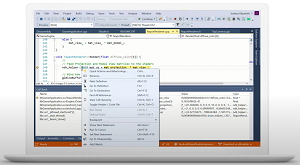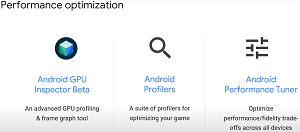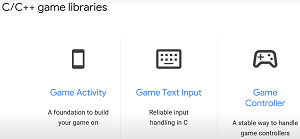News
Google Releases Visual Studio Tool for Android Game Development
Google released a Visual Studio extension for creating gaming apps for Android, targeting C++ developers.
The Android Game Development Extension (AGDE) is part of the new Android Game Development Kit (AGDK), a bundle of new and existing tools and libraries for full-cycle Android game creation: development, optimization, launching and iteration. While it includes C and C++ APIs, most game development is done in C++, which provides a high-performance, close-to-the-metal alternative to stalwart Android programming languages Kotlin and Java.
"The Android Game Development Extension (AGDE) lets you add Android as a target platform in your existing Visual C++ projects, making it easier to write C/C++ games for multiple platforms," Google said.
 [Click on image for larger view.] The Android Game Development Extension (AGDE) (source: Google).
[Click on image for larger view.] The Android Game Development Extension (AGDE) (source: Google).
With the initial launch of the AGDE, Google said it follows three key tenets
- Code built for game development. All libraries have been built and tested with performance in mind using C or C++ APIs.
- Reduce fragmentation. The AGDK tools and libraries work across many different Android versions. Most of these features will work on almost any device in use today.
- Built by Android, for Android. Features will be enhanced by future Android platform updates, and the libraries will provide backwards compatibility when possible.
and thus it decided to focus on three areas, guided by developer feedback:
- Integrated workflows
- C/C++ game libraries
- Performance optimization
 [Click on image for larger view.] The Unreal Engine Mobile Team Uses the AGDE (source: Google).
[Click on image for larger view.] The Unreal Engine Mobile Team Uses the AGDE (source: Google).
The AGDE Visual Studio tool fits into the integrated workflow area, along with game engine integrations and plugins.
The performance optimization includes GPU profiling/debugging, profiling, performance tuning and guidance, including best practices.
 [Click on image for larger view.] Performance Optimization (source: Google).
[Click on image for larger view.] Performance Optimization (source: Google).
Finally, regarding those C/C++ game libraries, three new ones have been added to existing frame pacing and high-performance audio libraries:
 [Click on image for larger view.] Libraries (source: Google).
[Click on image for larger view.] Libraries (source: Google).
- Game Activity is the foundation for C++ game development, providing C interfaces for all the expected Android events from screen rotation to app lifecycle. Google said it minimizes the amount of development time spent working with Java. Unlike Native Activity, Game Activity is compatible with fragments and extendable, making it easier to integrate SDKs.
- Game Text input provides a stable way to use the software keyboard in C, that is officially supported and will work across Android versions.
- Game Controller is a way to handle input from game controllers in C, to map their functions and to reconnect to the device when necessary.
The new kit and Visual Studio extension were announced during the July 12-13 Google for Games Developer Summit, for which more than 20 day 1 videos are available for on-demand viewing. The video for the Visual Studio extension is available here.
About the Author
David Ramel is an editor and writer at Converge 360.